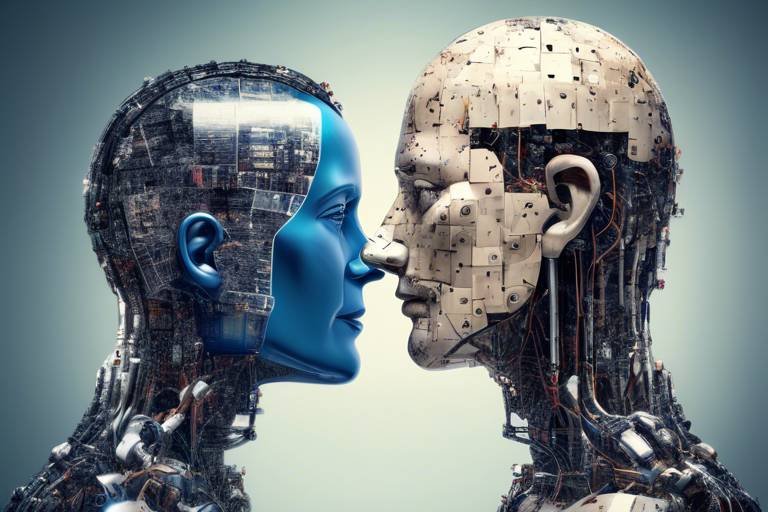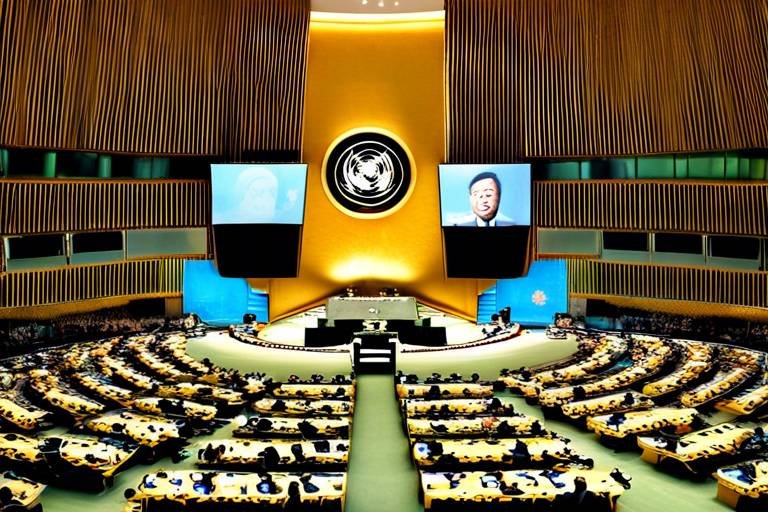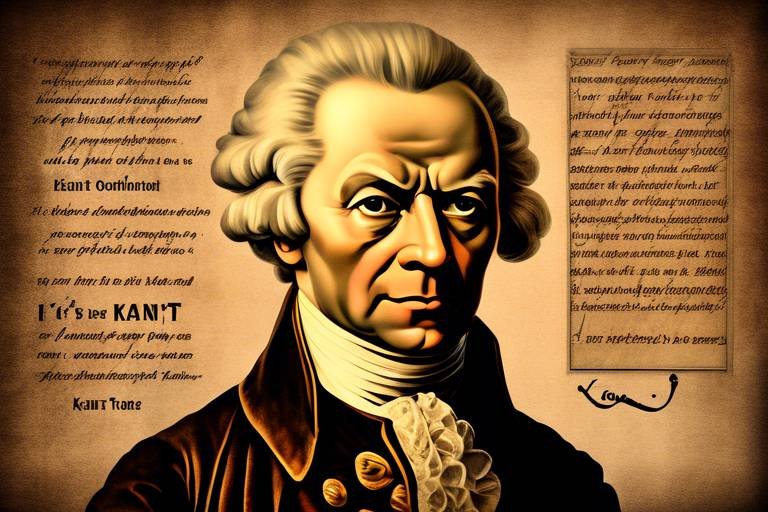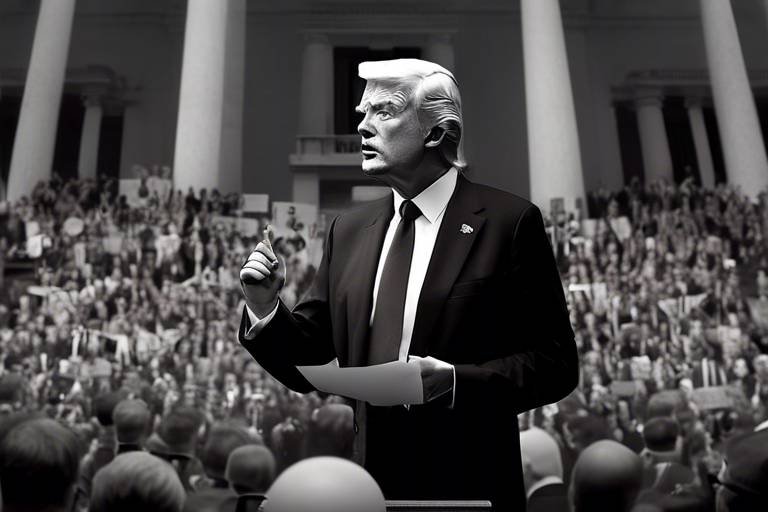Philosophical Recognition of Identity Politics
In today's world, the is more relevant than ever. It serves as a lens through which we can examine the complexities of individual and collective identities, as well as the broader social justice movements that have emerged from these discussions. Identity politics is not just a buzzword; it encapsulates a deep and intricate understanding of how our identities shape our experiences and interactions within society. By recognizing the significance of identity in political discourse, we can better navigate the challenges and opportunities that arise in our quest for social equity.
At its core, identity politics emphasizes the importance of personal experiences and the unique perspectives that come from various social identities, such as race, gender, sexuality, and class. This recognition is crucial in understanding how systemic inequalities are perpetuated and how they can be dismantled. When we acknowledge the diverse identities that exist within our communities, we begin to see the richness of human experience, which can lead to more inclusive and effective approaches to social change.
Moreover, identity politics invites us to reflect on the interconnectedness of identities. For instance, how does being a woman intersect with being a person of color? How do these identities shape one's worldview and political beliefs? These questions highlight the need for an intersectional approach, which considers the multiple layers of identity that inform our experiences. This perspective not only enriches our understanding of social dynamics but also fosters a sense of solidarity among marginalized groups.
In exploring the philosophical foundations of identity politics, we must also consider its implications for political discourse. The narratives we construct around our identities can significantly influence policy-making and public debate. For instance, when marginalized communities articulate their needs and experiences, they challenge the dominant narratives that often overlook their struggles. This shift in discourse can lead to transformative changes in how policies are formulated and implemented.
However, it's essential to recognize that identity politics is not without its challenges. The conversation around identity can sometimes become divisive, leading to essentialist views that oversimplify complex identities. This is where the tension between essentialism and intersectionality comes into play. Understanding this dynamic is crucial for fostering a more nuanced and inclusive dialogue about identity in the political sphere.
As we delve deeper into the philosophical recognition of identity politics, we must remain open to the evolving nature of these discussions. By embracing the complexities of identity, we can work towards a more just and equitable society where every voice is heard and valued.
- What is identity politics?
Identity politics refers to political positions based on the interests and perspectives of social groups with which people identify. It emphasizes the importance of personal experiences and identities in shaping political discourse.
- Why is identity important in politics?
Identity plays a crucial role in politics as it shapes individuals' experiences and perspectives, influencing their political beliefs and actions. Recognizing diverse identities can lead to more inclusive and effective social change.
- What is the difference between essentialism and intersectionality?
Essentialism is the belief that certain traits or characteristics are inherent to specific identities, while intersectionality recognizes that individuals hold multiple identities that intersect and influence their experiences in complex ways.

The Concept of Identity in Philosophy
Understanding identity is crucial to grasping the complexities of identity politics. The concept of identity, in philosophical terms, is multifaceted and encompasses various dimensions that shape our understanding of self and community. At its core, identity can be viewed through three primary lenses: personal identity, social identity, and collective identity. Each of these aspects plays a pivotal role in how individuals perceive themselves and how they relate to others.
Personal identity refers to the unique characteristics that define an individual. Philosophers like John Locke emphasized the importance of consciousness and memory in establishing personal identity over time. This notion raises intriguing questions: Are we the same person we were years ago? How do our experiences shape who we are? These questions delve into the essence of what it means to be an individual in a constantly changing world.
On the other hand, social identity emphasizes the roles we adopt within various groups. This includes our affiliations with family, friends, and larger societal categories such as race, gender, and religion. Social identity theorists like Henri Tajfel have argued that our sense of self is significantly influenced by the groups we belong to. This leads us to consider how our identities are not just personal but are also shaped by societal expectations and norms. For instance, being a woman in a patriarchal society can profoundly impact one's self-perception and the opportunities available.
Collective identity takes this a step further by highlighting the shared characteristics and experiences that bind groups together. It is through collective identity that movements for social justice often gain momentum. When individuals recognize themselves as part of a larger community—whether defined by ethnicity, gender, or sexual orientation—they can mobilize for change. This shared sense of identity fosters solidarity, creating a powerful force for advocacy and reform.
To illustrate the interplay between these dimensions, let’s consider the following table:
| Type of Identity | Description | Philosophical Influences |
|---|---|---|
| Personal Identity | Unique characteristics that define an individual over time. | John Locke, David Hume |
| Social Identity | Roles and affiliations within various societal groups. | Henri Tajfel, Erving Goffman |
| Collective Identity | Shared characteristics that unite groups for social action. | Charles Taylor, Nancy Fraser |
In essence, the philosophical exploration of identity reveals that our sense of self is not merely a personal endeavor but is deeply interwoven with social dynamics and collective experiences. Identity is a tapestry, woven from the threads of our personal histories, social roles, and collective movements. As we navigate the complexities of identity politics, recognizing these dimensions can help us understand the broader implications for social justice and political discourse in contemporary society.
- What is personal identity? Personal identity refers to the unique characteristics and experiences that define an individual over time.
- How does social identity differ from personal identity? Social identity emphasizes the roles and affiliations within various groups, while personal identity focuses on the individual’s unique traits.
- What is collective identity? Collective identity refers to the shared characteristics and experiences that bind groups together, often leading to social movements.
- Why is understanding identity important in contemporary society? Understanding identity helps us navigate social dynamics and fosters empathy, which is crucial for social justice and political discourse.

The Historical Context of Identity Politics
To truly understand identity politics, we must first explore its historical context. The concept did not appear out of thin air; rather, it has evolved through a series of significant social movements, cultural shifts, and philosophical debates. Identity politics began to take shape in the late 20th century, particularly in the wake of the civil rights movements across the globe. These movements highlighted the importance of recognizing and advocating for the rights of marginalized groups, paving the way for a more profound examination of how identity influences social dynamics.
One of the key milestones in the history of identity politics was the civil rights movement of the 1960s in the United States. This era saw activists fighting against racial discrimination and advocating for the rights of African Americans. Figures like Martin Luther King Jr. and Malcolm X emphasized the importance of collective identity, rallying people around shared experiences of oppression. This was not just about individual rights; it was about forging a sense of community and belonging that transcended personal narratives.
Following this, the feminist movement emerged, challenging the traditional roles assigned to women and advocating for gender equality. Feminists like bell hooks and Gloria Steinem brought attention to the intersections of race, class, and gender, arguing that the fight for women's rights must include various identities. This intersectional approach laid the groundwork for future discussions on how identity informs social justice.
In the 1980s and 1990s, the LGBTQ+ rights movement further expanded the conversation around identity politics. Activists began to assert that sexual orientation and gender identity are integral components of one's identity, deserving of recognition and protection. The fight against discrimination based on sexual orientation and gender identity highlighted the need for a broader understanding of identity that includes not just race and gender, but also sexuality.
As identity politics gained traction, it also began to intersect with other movements, such as environmental justice, which recognizes that marginalized communities often bear the brunt of environmental degradation. This intersectionality has led to a more nuanced understanding of how various identities interact and influence one's experience in society.
Throughout the years, various thinkers have contributed to the discourse surrounding identity politics, shaping its evolution. For instance, the concept of intersectionality, coined by Kimberlé Crenshaw, emphasizes that individuals can belong to multiple marginalized groups simultaneously, leading to unique experiences of oppression. This idea has become a cornerstone of contemporary identity politics, urging us to consider the complexities of identity beyond singular categories.
In summary, the historical context of identity politics is rich and multifaceted. It has been shaped by numerous movements, each contributing to our understanding of how identity influences social dynamics and political discourse. As we navigate the complexities of identity in today's society, it is essential to recognize the roots of these ideas and the voices that have paved the way for this ongoing conversation.
- What is identity politics? Identity politics refers to political positions based on the interests and perspectives of social groups with which people identify.
- How did identity politics originate? It originated from various social movements, including civil rights, feminism, and LGBTQ+ rights, which highlighted the importance of collective identities.
- Why is intersectionality important in identity politics? Intersectionality is crucial because it acknowledges that individuals can belong to multiple marginalized groups, leading to unique experiences of oppression.
- What are some critiques of identity politics? Critics argue that identity politics can lead to divisiveness, essentialism, and exclusion within identity-based movements.

Influential Thinkers in Identity Politics
The discourse surrounding identity politics has been profoundly shaped by several influential thinkers whose ideas have sparked debates and inspired movements. These philosophers have challenged conventional understandings of identity, pushing the boundaries of how we perceive ourselves and our communities. Among the most notable figures are Michel Foucault, Judith Butler, and bell hooks. Each of these thinkers has contributed uniquely to the conversations about power, gender, and social justice, making their work essential for anyone looking to understand the complexities of identity politics.
Michel Foucault's theories on power relations provide a critical lens through which we can examine how identities are constructed and maintained within societal frameworks. He argued that identity is not a fixed essence but rather a fluid construct shaped by historical and cultural contexts. This perspective invites us to consider how power dynamics influence our understanding of self and others. Foucault's insights encourage a questioning of the status quo, prompting individuals to explore the ways in which societal norms dictate identity formation.
Judith Butler's groundbreaking work on gender performativity has also had a significant impact on identity politics. Butler posits that gender is not something we are, but rather something we do—a performance shaped by societal expectations. This idea challenges traditional notions of gender identity, suggesting that it is a result of repeated actions rather than an inherent quality. Butler's theories have been instrumental in feminist and queer movements, advocating for a more inclusive understanding of gender that recognizes the diversity of human experiences.
Another pivotal figure is bell hooks, whose writing emphasizes the intersection of race, class, and gender in shaping identity. Hooks argues that identity politics must consider these overlapping factors to effectively address social injustices. Her work highlights the importance of love and community in the struggle for social change, suggesting that a collective approach to identity can foster solidarity among marginalized groups. By advocating for an intersectional perspective, hooks encourages a more nuanced understanding of identity that transcends simplistic categorizations.
In summary, the contributions of Foucault, Butler, and hooks have significantly enriched the field of identity politics. Their ideas challenge us to rethink our assumptions about identity and to recognize the intricate ways in which power, performance, and intersectionality shape our lives. As we navigate the complexities of contemporary society, the insights of these thinkers remain vital for fostering a more inclusive and equitable discourse around identity.
- What is identity politics? Identity politics refers to political movements and ideologies that focus on the interests and perspectives of specific social groups, often defined by characteristics such as race, gender, sexuality, or ethnicity.
- Who are some key figures in identity politics? Key figures include Michel Foucault, Judith Butler, and bell hooks, each of whom has contributed significantly to the discourse surrounding identity and social justice.
- Why is intersectionality important in identity politics? Intersectionality is crucial because it acknowledges that individuals can belong to multiple social categories simultaneously, and these overlapping identities can create unique experiences of oppression or privilege.
- How does identity politics impact political discourse? Identity politics influences political narratives by prioritizing the voices and experiences of marginalized groups, shaping policy-making and public debate around social justice issues.

Foucault's Perspective on Power and Identity
Michel Foucault, a towering figure in contemporary philosophy, offers a profound lens through which we can analyze the intricate relationship between power and identity. His work challenges us to reconsider the very foundations of how identities are formed and maintained within societal structures. Foucault argues that identity is not a fixed essence; rather, it is dynamically constructed through various power relations and discourses that permeate our daily lives. This perspective invites us to ask: How do societal norms shape our understanding of who we are?
Foucault's analysis of power is particularly compelling. He posits that power is not merely repressive but is also productive. It creates subjectivities and identities by establishing norms that dictate what is considered acceptable or deviant. For instance, consider how societal expectations around gender and sexuality have historically influenced individual identities. Foucault’s insights compel us to recognize that our identities are often shaped by external forces—forces that dictate how we perceive ourselves and how we are perceived by others.
One of Foucault’s key contributions is the concept of biopower, which refers to the regulation of populations through an array of institutions and practices. This concept is crucial in understanding how identity politics operates within broader socio-political contexts. Through biopower, identities are not just personal but are also political, as they are influenced by laws, policies, and cultural narratives that seek to categorize and control individuals. For example, policies surrounding immigration, healthcare, and education often reflect and reinforce specific identities, influencing how individuals understand their place within society.
Foucault also emphasizes the role of knowledge in shaping identities. He famously stated, “Knowledge is not for knowing: knowledge is for cutting.” This assertion highlights how knowledge systems can create hierarchies and power dynamics that affect identity formation. In this sense, knowledge is a tool that can either empower individuals or serve to marginalize them. Thus, the narratives we accept as truth can significantly impact our identities and the identities of those around us.
In summary, Foucault’s perspective on power and identity invites us to critically examine the forces that shape our identities. By recognizing the fluid and constructed nature of identity, we can better understand the complexities of identity politics in contemporary society. His ideas encourage us to challenge normative assumptions and to engage in a deeper dialogue about how power dynamics influence our self-conceptions and collective identities.
- What is Foucault's view on identity? Foucault views identity as a construct shaped by power relations and societal norms rather than a fixed essence.
- How does power influence identity formation? Power shapes identities by establishing norms and expectations that dictate how individuals perceive themselves and are perceived by others.
- What is biopower in Foucault's theory? Biopower refers to the regulation of populations through institutions and practices, influencing how identities are formed and maintained.
- Why is knowledge important in Foucault's analysis? Knowledge serves as a tool that can empower or marginalize individuals, impacting their identities and the narratives they accept.

Butler's Gender Theory and Identity
Judith Butler's contributions to the understanding of gender and identity have been nothing short of revolutionary. In her seminal work, "Gender Trouble," Butler challenges the conventional notions of gender as a fixed and binary category. Instead, she proposes that gender is a performative act, meaning that it is not something one is, but rather something one does. This perspective shifts the focus from identity as an innate quality to identity as a series of actions and expressions that individuals enact in their daily lives.
Butler's theory suggests that gender is constructed through repeated performances and societal norms, which can lead to the understanding of identity as fluid and dynamic. By framing gender in this way, Butler opens up a space for individuals to explore their identities beyond the constraints of traditional definitions. This idea resonates deeply within the context of identity politics, as it allows for a more inclusive approach to understanding the diverse experiences of individuals across different backgrounds.
Moreover, Butler's work has had a profound impact on feminist and queer movements, encouraging activists to challenge the rigid categories that often limit self-expression. Her ideas promote the notion that identity is not merely a matter of personal identification but is also shaped by societal expectations and power dynamics. This intersection of identity and power is crucial in understanding how marginalized groups can reclaim their narratives and challenge oppressive structures.
To further illustrate Butler's impact, consider the following key points:
- Gender as Performance: Butler argues that gender is not a stable identity but a performance that individuals enact based on societal expectations.
- Subversion of Norms: By recognizing gender as performative, individuals can subvert traditional norms and create new possibilities for identity expression.
- Intersectionality: Butler's theories intersect with the concept of intersectionality, which emphasizes how various social identities (race, class, gender, etc.) interact and shape individual experiences.
In summary, Judith Butler's gender theory profoundly influences how we understand identity within the framework of identity politics. By highlighting the performative aspects of gender, Butler encourages a reevaluation of how identities are constructed and understood, fostering a more inclusive dialogue that resonates with the experiences of marginalized communities. Her work invites us to consider the complexities of identity, urging us to embrace the fluidity and multiplicity that exists within each individual.
- What is Judith Butler's main argument in her gender theory?
Butler argues that gender is a performative act, not a fixed identity, challenging traditional binary notions of gender. - How has Butler's work influenced feminist movements?
Her ideas encourage a more inclusive understanding of gender, allowing for diverse expressions and challenging rigid categories. - What is the significance of performativity in identity politics?
Performative acts highlight the fluidity of identity, promoting a more nuanced understanding of how identities are shaped by societal norms.

Collective Identity and Social Movements
Collective identity serves as the backbone of social movements, acting like a powerful adhesive that binds individuals together in pursuit of a common goal. Imagine a group of people standing shoulder to shoulder, each one representing a unique story, yet united by a shared experience or struggle. This phenomenon is not just a happenstance; it is a deliberate construction of identity that fosters solidarity among members of a community. In the context of social movements, collective identity emerges from the intersection of personal experiences, cultural backgrounds, and historical narratives, allowing individuals to see themselves as part of a larger collective.
When individuals come together under a shared identity, they create what is known as a social movement. These movements often arise in response to perceived injustices, such as racial discrimination, gender inequality, or environmental degradation. The collective identity formed within these movements enhances their ability to mobilize resources, attract media attention, and influence public opinion. For instance, the Civil Rights Movement in the United States during the 1960s exemplifies how collective identity can galvanize action against systemic oppression. Leaders like Martin Luther King Jr. and organizations such as the NAACP helped to forge a collective identity among African Americans, emphasizing shared experiences of discrimination and a common aspiration for equality.
Furthermore, collective identity is not merely about shared grievances; it also encompasses the vision for the future that the group aspires to achieve. This vision creates a sense of purpose and direction, motivating individuals to participate actively in the movement. For example, in the LGBTQ+ rights movement, collective identity has played a crucial role in advocating for marriage equality and anti-discrimination laws. The slogan “Love is Love” resonates deeply within the community, uniting diverse individuals under a banner of acceptance and equality.
However, it’s essential to recognize that collective identity can be a double-edged sword. While it fosters unity and strength, it can also lead to the exclusion of those who do not fit neatly into the defined group. This is where the tension between inclusivity and exclusivity arises. Social movements must navigate the delicate balance of maintaining a strong collective identity while being open to diverse perspectives and experiences. For instance, the feminist movement has historically faced critiques regarding its inclusivity, as early iterations often centered around the experiences of white, middle-class women, sidelining voices of women of color and those from different socioeconomic backgrounds.
In conclusion, collective identity is a vital component of social movements, providing a sense of belonging and purpose. It enables individuals to transcend their personal struggles and become part of something greater. Yet, as movements evolve, they must remain vigilant in ensuring that their collective identity is inclusive and representative of the diverse experiences within their ranks. Only then can they truly embody the principles of social justice and equality for all.
- What is collective identity? - Collective identity refers to the shared sense of belonging and common purpose among a group of individuals, often formed around shared experiences or social issues.
- How does collective identity influence social movements? - It provides a unifying force that helps mobilize individuals, attract attention, and create a cohesive narrative for the movement.
- Can collective identity lead to exclusion? - Yes, while it fosters unity, it can also result in the exclusion of those who do not fit the defined group, highlighting the need for inclusivity.
- What are some examples of social movements driven by collective identity? - The Civil Rights Movement, LGBTQ+ rights movement, and various environmental movements are notable examples where collective identity played a crucial role.

Critiques of Identity Politics
Identity politics has become a lightning rod for debate in contemporary society, generating both passionate support and fierce criticism. Many argue that while identity politics can empower marginalized groups, it can also lead to divisiveness and create barriers between different communities. Critics often express concern that the focus on identity can overshadow shared experiences and common goals, leading to a fragmented political landscape. The fundamental question arises: can we advocate for social justice while simultaneously recognizing the complexities of individual identities?
One of the primary critiques of identity politics is its potential for **essentialism**. Essentialism posits that individuals within a particular identity group share inherent characteristics, which can lead to oversimplified and stereotypical representations. For instance, when people assume that all women share the same experiences or perspectives, it ignores the rich diversity within that group, including differences in race, class, sexuality, and other factors. This reductionist view can alienate those who do not fit neatly into predefined categories, ultimately undermining the very movements that seek to uplift marginalized voices.
Moreover, the rise of identity politics has sparked a significant debate around **intersectionality**. Intersectionality, a term coined by legal scholar Kimberlé Crenshaw, emphasizes the interconnected nature of social categorizations and how they create overlapping systems of discrimination or disadvantage. Critics argue that focusing too heavily on singular identities can obscure the complexities of intersectionality, which is crucial for understanding the full scope of individuals' experiences. For example, a Black woman may face different challenges than a white woman or a Black man, and failing to acknowledge these differences can lead to a lack of inclusivity within social movements.
Another concern is that identity politics can foster a sense of **tribalism**, where individuals become more loyal to their identity group than to broader social justice causes. This tribalism can lead to a mentality of "us versus them," making it difficult to build coalitions across different groups. As a result, political discourse can become polarized, with individuals retreating into echo chambers that reinforce their beliefs rather than engaging in constructive dialogue. The challenge lies in fostering solidarity while still honoring the unique experiences of diverse identity groups.
In addition to these critiques, identity politics can also complicate political discourse. The emphasis on identity can shift the focus from policy and systemic issues to personal narratives and experiences, sometimes at the expense of broader discussions about justice and equality. This shift can lead to a situation where political debates become overly focused on individual identities rather than collective action toward systemic change. It raises the question: how do we balance the need for representation with the necessity of addressing the root causes of social injustices?
In summary, while identity politics plays a crucial role in advocating for marginalized groups, it is not without its challenges. The critiques surrounding essentialism, intersectionality, tribalism, and the impact on political discourse highlight the need for a nuanced approach to identity in social justice movements. As we navigate these complexities, it is essential to foster dialogue that embraces both individual identities and collective action, ensuring that the fight for justice is inclusive and representative of all voices.
- What is identity politics? Identity politics refers to political positions based on the interests and perspectives of social groups with which people identify.
- Why is identity politics controversial? It is controversial because it can lead to divisions within society, oversimplification of identities, and a focus on individual experiences rather than collective issues.
- What is intersectionality? Intersectionality is a framework for understanding how various social identities (like race, gender, and class) intersect and impact individuals' experiences of oppression and privilege.
- How can identity politics be beneficial? Identity politics can empower marginalized groups, raise awareness of social injustices, and promote representation in political discourse.

Essentialism vs. Intersectionality
The debate between essentialism and intersectionality is pivotal in the realm of identity politics, shaping how we understand and represent identities within social movements. At its core, essentialism posits that certain characteristics—such as race, gender, or sexual orientation—define a person's identity in a fixed manner. This perspective often leads to the oversimplification of complex identities, reducing individuals to a single aspect of their experience. It suggests that all members of a particular group share the same traits, experiences, and needs, which can be problematic. For instance, when we say that all women experience oppression in the same way, we ignore the unique challenges faced by women of color, LGBTQ+ women, and those from different socio-economic backgrounds.
On the other hand, intersectionality, a term coined by legal scholar Kimberlé Crenshaw, emphasizes the interconnected nature of social categorizations and how they create overlapping systems of discrimination or disadvantage. This framework recognizes that individuals possess multiple identities that intersect, influencing their experiences and struggles. For example, a Black woman may face both racial and gender discrimination, and understanding her identity requires acknowledging how these factors interact. Intersectionality advocates for a more nuanced approach to identity politics, urging movements to consider the diverse experiences within groups rather than relying on a monolithic representation.
To illustrate the differences between these two concepts, consider the following table:
| Aspect | Essentialism | Intersectionality |
|---|---|---|
| Definition | Fixed identity traits that define a group | Interconnected identities that influence experiences |
| Implications | Overgeneralization, potential exclusion of diverse voices | Recognition of complexity, fostering inclusivity |
| Example | Assuming all women face the same challenges | Understanding the unique struggles of a Black transgender woman |
The tension between essentialism and intersectionality raises critical questions about representation and advocacy. While essentialism can sometimes create a sense of unity among marginalized groups, it risks alienating those whose identities do not fit neatly into predefined categories. Intersectionality, conversely, promotes a more inclusive approach, but it can also lead to fragmentation within movements as various identities vie for recognition and resources. Navigating this complex landscape requires a delicate balance—acknowledging shared experiences while also honoring the unique challenges faced by individuals at the intersections of multiple identities.
In conclusion, the discussion of essentialism versus intersectionality is not merely academic; it has real-world implications for how we engage in social justice work. By embracing intersectionality, activists and scholars can foster a more inclusive dialogue that reflects the diverse tapestry of human experience, ultimately leading to more effective and equitable social movements.
- What is essentialism in identity politics? Essentialism is the belief that certain traits define a group's identity in a fixed manner, often leading to overgeneralizations about individuals within that group.
- How does intersectionality differ from essentialism? Intersectionality acknowledges that individuals have multiple, overlapping identities that shape their experiences, advocating for a more nuanced understanding of social categorizations.
- Why is the debate between essentialism and intersectionality important? This debate influences how marginalized groups are represented and understood, impacting social movements and the effectiveness of advocacy efforts.

Identity Politics and Political Discourse
Identity politics has become a dominant force in shaping the landscape of political discourse in contemporary society. As we navigate through various political arenas, we notice that identities—be they based on race, gender, sexuality, or other social categories—are increasingly influencing how policies are formulated and how political debates unfold. This shift raises an important question: how do our identities shape our political narratives? The answer is multifaceted and deeply rooted in the dynamics of power and representation.
At its core, identity politics seeks to give voice to marginalized groups, advocating for their rights and recognition within the broader societal framework. By foregrounding these identities, movements aim to challenge the status quo and bring attention to issues that are often overlooked. For instance, the Black Lives Matter movement has highlighted systemic racism and police brutality, pushing these topics into national conversations. Similarly, LGBTQ+ movements have fought for equal rights and representation, reshaping political discussions around marriage equality and anti-discrimination laws.
However, the rise of identity politics is not without controversy. Critics argue that it can lead to divisiveness, as individuals may prioritize their group identities over shared human experiences. This can create an “us versus them” mentality, making it difficult to forge alliances across different identity groups. For example, while women’s rights movements have made significant strides, some argue that the focus on gender can overshadow other critical issues, such as class or race, leading to a fragmented approach to social justice.
Moreover, the impact of identity politics extends into the realm of political discourse itself. Politicians and public figures are increasingly aware of the importance of identity in shaping their messages. Campaigns now often tailor their rhetoric to resonate with specific demographic groups, employing language and imagery that appeal directly to their experiences and concerns. This strategy can be effective in mobilizing voters, but it also raises questions about authenticity and the potential for tokenism. Are politicians genuinely committed to the causes they champion, or are they merely leveraging identity for electoral gain?
To illustrate the intersection of identity and political discourse, consider the following table that outlines key identity-based movements and their influence on political dialogue:
| Movement | Key Issues Addressed | Impact on Political Discourse |
|---|---|---|
| Black Lives Matter | Racial injustice, police violence | Increased focus on systemic racism in policy discussions |
| LGBTQ+ Rights | Marriage equality, anti-discrimination laws | Shift in public opinion and legal frameworks |
| Women’s March | Gender equality, reproductive rights | Heightened awareness of gender issues in political platforms |
This table highlights how different movements have not only brought attention to their specific issues but have also transformed the broader political landscape. As these discussions evolve, it's essential to recognize the complexity of identity and the various factors that contribute to it. The interplay between personal experiences, societal norms, and historical contexts shapes how individuals perceive their identities and, in turn, influences their political engagement.
In conclusion, identity politics profoundly impacts political discourse by reshaping narratives, mobilizing communities, and challenging existing power structures. While it offers a platform for marginalized voices, it also requires careful navigation to avoid pitfalls of divisiveness and exclusion. As we move forward, it’s crucial to foster dialogue that embraces the richness of our diverse identities while striving for unity in the pursuit of social justice.
- What is identity politics? Identity politics refers to political positions based on the interests and perspectives of social groups with which people identify, often focusing on issues of race, gender, sexuality, and other identities.
- How does identity politics affect social movements? It empowers marginalized groups to advocate for their rights and recognition, fostering solidarity and mobilization for social change.
- What are the criticisms of identity politics? Critics argue that it can lead to divisiveness, essentialism, and exclusion, potentially overshadowing broader social issues.
- Can identity politics be inclusive? Yes, by embracing intersectionality, identity politics can promote a more comprehensive understanding of social justice that considers multiple identities simultaneously.
Frequently Asked Questions
- What is identity politics?
Identity politics refers to political positions based on the interests and perspectives of social groups with which people identify. It emphasizes the importance of individual and collective identities in shaping political discourse and social justice movements.
- Why is understanding identity important in philosophy?
Understanding identity is crucial because it helps us navigate our own sense of self and our relationships with others. Philosophical theories of identity explore personal, social, and collective dimensions, enabling us to grasp how identities are formed and how they influence our interactions and societal structures.
- Who are some influential thinkers in identity politics?
Notable figures include Michel Foucault, whose theories on power and identity reveal how identities are constructed; Judith Butler, who challenges traditional gender notions through her concept of gender performativity; and bell hooks, who explores the intersection of race, gender, and class in identity politics.
- What are the critiques of identity politics?
Critiques of identity politics often focus on concerns about divisiveness, essentialism, and the potential for exclusion. Critics argue that focusing too much on identity can lead to fragmentation within social movements, making it harder to achieve collective goals.
- How do essentialism and intersectionality differ?
Essentialism posits that certain traits are inherent to specific identities, while intersectionality recognizes that individuals can belong to multiple social categories simultaneously, each influencing their experiences. Understanding this distinction is vital for fostering inclusivity within identity-based discussions.
- What role does identity politics play in political discourse?
Identity politics significantly shapes political narratives and influences policy-making. It affects how issues are framed, who gets represented, and how public debates unfold, impacting the overall dynamics of contemporary society.



















